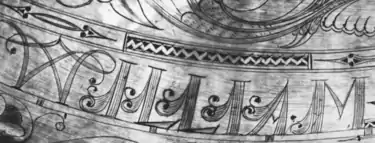
John Bush was an African provincial soldier with the Massachusetts militia who fought on the side of Britain during the French and Indian Wars in North America. He is known for his carving of powder horns of the time.[1][2] One of his 1756 horns has been part of a travelling exhibition throughout Canada and US.[3][4] The quality of his carving and use of calligraphy has been called "superb".[5] Bush's carving style and decorative embellishments were used in for the Lake George School during the French and Indian War. Other powder horn carvers adopted Bush's engraving style. They are known as the Sekrig-Page carver, the I.W. carver, and the Memento Mori carver. Bush is considered a founder of American folk art. He was captured during the battle and fall of Fort William Henry August 9, 1757. What happened after this is not known. John Bush's father, George Bush, moved to Massachusetts Bay during the eighteenth century. John Bush's mother is unknown. George was a farmer in North Parish of Shrewsbury (now Boyleston). George died at the age of eighty years old in 1767. John had three brothers who also fought with the Massachusetts militia during the war. They were George Bush, who died on September 25, 1755, and Joseph Bush, who died on April 8, 1756.[4]
References
- ↑ USA Today Magazine. May2005, Vol. 133 Issue 2720, pp 48–52. 5p.
- ↑ "The Great Warpaths".
- ↑ Anderson, Fred (2005). The war that made America : a short history of the French and Indian War. New York: Viking. ISBN 9781101117750.
- 1 2 "Powder Horns Open Windows Into Soldiers Lives During 1750s". www.antiquesandthearts.com. 24 October 2006. Retrieved 2017-09-27.
- ↑ Guthrnan, William H. "Powder Horns Carved in the Provincial Manner, 1744–1777" (PDF). American Society of Arms Collectors. Retrieved September 27, 2017.